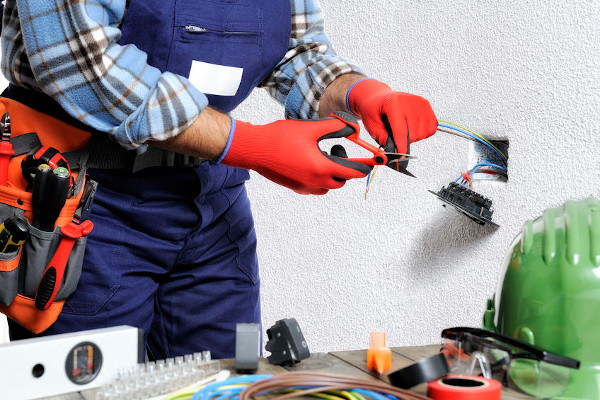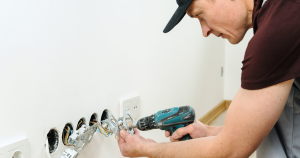If your Arizona home or business needs emergency electrical repairs, you want a professional who will get the job done.
Not everyone is suitable for electrical work; it requires training, experience, and knowledge of local regulations. Let’s take a look at how to tell a handyman from the electrical professionals.
Licensing
In many places, working as a handyman doesn’t require specific licensing. A handyman may understand general electrical issues, but often they aren’t legally permitted to work in a house or commercial system.
Electrical professionals are licensed and trained to possess extensive knowledge of the inner and outer workings of your home’s electrical maintenance.
Expertise
While a handyman is a jack-of-all-trades, they may not have the same knowledge of electrical systems as a trained professional. In emergency cases, the jobs at hand may need more than basic knowledge.
This can add extra time to an otherwise quick repair. For example, it may take them an hour when it should take minutes.
On the other hand, a licensed electrical contractor is specifically trained in the field to handle anything that pertains to your home or company electrical system.
There are four different types of electricians, each receiving different levels and areas of training. These include:
- Residential Electricians – Install, maintain and repair electrical components in personal homes. To obtain this title one must train in the classroom and in the field for at least 4 years, then pass a rigorous state exam.
- Commercial Electricians – Specialize in electrical work on construction sites, commercial buildings, and mechanical electrical systems. Standards are higher for this type of electrician as they work more in the public setting. They are required to work under a Master Electrician prior to becoming certified.
- Journeymen – Typically work in the fields of construction, utility companies or manufacturing plants. They are also trained and licensed for residential and commercial work, or may also do overhead lines work. Passing the Journeyman Exam is required for certification.
- Master Electricians – Tend to be a contractor, a supervisor or own their own company. This position requires much more training and a college degree in the field.
Insurance
Working as a handyman may require liability insurance to protect the client and their property. Unfortunately, there is telling the coverage they have, or if they are even insured at all.
Depending on your homeowner’s coverage, any damage that results from poorly performed electrical work may not be insured.
A state-licensed electrician has comprehensive insurance, and your homeowner’s policies are more likely to cover damage if professionals are licensed.
Electrical Codes
Electrical codes are national and state regulations that ensure proper installation and handling of commercial and residential electrical systems.
Electrical professionals are trained to follow these laws. They will also advise you of local and national codes to ensure you understand why things must be completed the way they are.
A handyman may not be aware of specific codes and there is no guarantee they will follow codes that are written with your safety in mind.
Tools
Since their work is so broad, a handyman may not have the specific tools at hand to complete maintenance.
An electrical contractor arrives with the needed materials in hand to quickly and efficiently complete the repair immediately.
Safety
During training, licensed electrical professionals learn the dangers of electrical work and take the necessary precautions.
Handymen have an idea of what not to do, but because they aren’t licensed, there’s more chance of further issues.
Pricing
Remember, you get what you pay for. The lower upfront price of hiring a handyman may be tempting, but the long term factors and risks may cost you.
Value your peace of mind by making an appointment with a highly-trained professional within your budget.
Reliability
There is an hour requirement of training that must be achieved before an individual can work in the field as a licensed, certified professional electrician.
A professional electrician has spent years receiving training and earning their license. This speaks to a willingness to learn the trade and provide the best service to each customer.
A handyman generally hasn’t spent years training specifically in the electrical field to provide the same reliable electrical service. Additionally, they may only have a basic knowledge of the wiring and issues in residential areas.
Promptness
A handyman usually works on his/her own hour, and there’s no guarantee they will be punctual.
Contractors that operate under a company are held to a higher standard. The best electricians pride themselves on being prompt and getting the job done right.
Professionalism
The differences increase as professional electricians will wear a uniform and have a company van or truck with an official logo. The safety gear they wear will also top-quality.
A handyman may not wear professional safety gear and may arrive at the job site in an unmarked personal vehicle.
Quality of Work
It’s always highly recommended to use a full-service electrician for an issue in your electrical system. The quality of the work speaks for itself.
Have peace of mind by hiring a licensed electrical contractor from Assurance Electrical Services to work diligently and safely in your residential property or business.
Jeff Brandlin is the founder of Assurance Electrical Services, LLC. He started in the electrical industry when he was 21 and had worked in several electrical firms before founding Assurance Electrical. Jeff is dedicated to providing the best quality service to his clients and always puts their needs first. Outside work, Jeff enjoys spending time with his wife and children.





